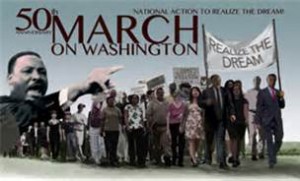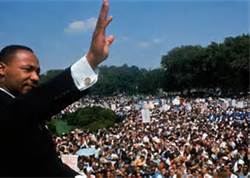I wasn’t at the 50th Anniversary of the historic March on Washington. Mind you, I wasn’t opposed to the March, nor do I consider marches as a waste of time as many critics do. I had attended the Redeem The Dream March in 2000, as well as the Million Man and Million Family Marches in Washington, DC, the Million Woman March in Philadelphia, PA and the first Million Youth Marches in Harlem, 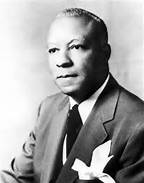
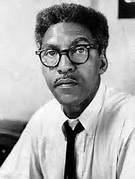 NY and Atlanta, Georgia. Thus, while I don’t consider marches to be The Answer To Black People’s Problems, I am not a “Marchiphobe” either. Marches can inspire people to take more concrete action in the cause of social justice, and as such they have a certain, if limited, value. And there have been so many marches. But the March on Washington, the 1963 March that was organized by A. Philip Randolph, Bayard Rustin (above) and the Southern Christian Leadership Conference, the March where America heard the “I Have A Dream” speech by the Rev. Dr. Martin Luther King Jr., is considered by many to be the Granddaddy of them all. Thus, we could expect that the 50th Anniversary of that March would be regarded as a near-sacred event by those who participated in and remember the Civil Rights Movement of the Sixties.
NY and Atlanta, Georgia. Thus, while I don’t consider marches to be The Answer To Black People’s Problems, I am not a “Marchiphobe” either. Marches can inspire people to take more concrete action in the cause of social justice, and as such they have a certain, if limited, value. And there have been so many marches. But the March on Washington, the 1963 March that was organized by A. Philip Randolph, Bayard Rustin (above) and the Southern Christian Leadership Conference, the March where America heard the “I Have A Dream” speech by the Rev. Dr. Martin Luther King Jr., is considered by many to be the Granddaddy of them all. Thus, we could expect that the 50th Anniversary of that March would be regarded as a near-sacred event by those who participated in and remember the Civil Rights Movement of the Sixties.
The actual date of the March was commemorated on Wednesday, August 28, with speeches by any number of prominent persons, most notably President Barack Obama and Veteran Civil Rights Activist John Lewis. And while the statements made on that day certainly were important and will be quoted often in the days and weeks to come, I want to concentrate this edition of my commentary on the March held the previous Saturday, August 24, in the absence of some of the high-level political operatives and high-powered celebrities, or what some may want to refer to as the People’s Version of the 50th Anniversary of the March On Washington (though some prominent people were there as well).
I understand the critiques of Marches as “picnics”, as Ancestor Malcolm X had stated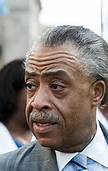 in 1963, a sentiment echoed by critics of the 50th Anniversary March. I also understand the compulsion many of us feel to participate in these Marches, as they often do help to motivate those activists among us who lose our focus and our motivation. Marches such as these also help re-establish the need in the public eye for continued activism, as demonstrated by the expression of discontent by such a mass of people as only a March, or a riot, seems able to exp
in 1963, a sentiment echoed by critics of the 50th Anniversary March. I also understand the compulsion many of us feel to participate in these Marches, as they often do help to motivate those activists among us who lose our focus and our motivation. Marches such as these also help re-establish the need in the public eye for continued activism, as demonstrated by the expression of discontent by such a mass of people as only a March, or a riot, seems able to exp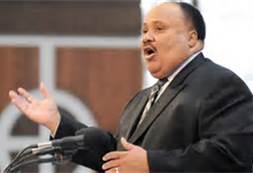 ress. As Rev. Al Sharpton (right), President of the National Action Network (NAN) and one of the organizers of the 2013 March along with Martin Luther King III (left), son of the iconic Civil Rights Leader, and the National Association for the Advancement of Colored People (NAACP), stated the day after the 50th Anniversary March, “Marches don’t solve problems. They expose them.”
ress. As Rev. Al Sharpton (right), President of the National Action Network (NAN) and one of the organizers of the 2013 March along with Martin Luther King III (left), son of the iconic Civil Rights Leader, and the National Association for the Advancement of Colored People (NAACP), stated the day after the 50th Anniversary March, “Marches don’t solve problems. They expose them.”
An Unrealized Dream
Amid all the speeches delivered at the 50th Anniversary March, the most important themes revolved around the as-yet unrealized Dream of Dr. King and a Call to Action to all of us to help ensure that what remains of the Dream does not die. In the words of Rev. Sharpton, “Fifty years ago, Dr. King said America gave Blacks a check that bounced. Well, we redeposited the check. But guess what? It bounced again.”
Part of the issue here, though, is the fact that now there are an increasing number of groups trying to cash that check. While Black people were primarily being lynched, terrorized and excluded from society by courts, police and vigilantes alike, and while our leaders were being assassinated, the beneficiaries of the collective suffering of Black people grew to include 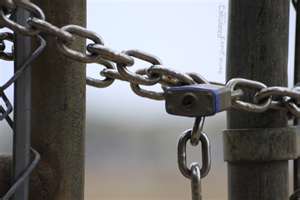 women’s groups, the Latino Immigrant community and the gay community. True, the rights that were being fought for were meant to be equal rights for all, but as businesses owned by the White wives of politicians and businessmen were counted in the statistics of “minority enterprise”, opponents of affirmative action targeted the mild progress of Blacks as a signal that We Have Overcome. As the Latino population has overtaken the Black population, in part due to Black Latinos being classified as “Hispanic” in many cases, Americans of Afrikan descent began to see the gains of the Civil Rights Movement slipping away. And as gay citizens expressed their struggle for Marriage Equality as an issue analogous to the Civil Rights and Black Power Struggle, some in the Afrikan-American Community, and indeed in the Pan-Afrikanist Community, became frustrated at these other causes essentially “leapfrogging” the Black struggle by riding our coattails. For some of us, this has led to resentment and a deepening distrust of the “system” that has oppressed us for hundreds of years, yet expects us to assimilate into as the price for our “freedom”.
women’s groups, the Latino Immigrant community and the gay community. True, the rights that were being fought for were meant to be equal rights for all, but as businesses owned by the White wives of politicians and businessmen were counted in the statistics of “minority enterprise”, opponents of affirmative action targeted the mild progress of Blacks as a signal that We Have Overcome. As the Latino population has overtaken the Black population, in part due to Black Latinos being classified as “Hispanic” in many cases, Americans of Afrikan descent began to see the gains of the Civil Rights Movement slipping away. And as gay citizens expressed their struggle for Marriage Equality as an issue analogous to the Civil Rights and Black Power Struggle, some in the Afrikan-American Community, and indeed in the Pan-Afrikanist Community, became frustrated at these other causes essentially “leapfrogging” the Black struggle by riding our coattails. For some of us, this has led to resentment and a deepening distrust of the “system” that has oppressed us for hundreds of years, yet expects us to assimilate into as the price for our “freedom”.
The Death of Trayvon Martin and the Criminalization of Young Black Males
Over the weeks that have passed since the not-guilty verdict in the trial of George Zimmerman, who had killed unarmed 17-year-old Trayvon Martin on February 26, 2012, the call had been to make the case, and the enactment of Trayvon’s Law against profiling of African-American youth, a major focus of the March. The fact is that, since the 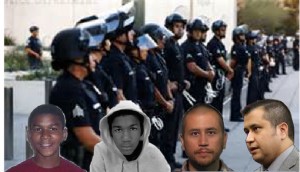 March on Washington in 1963, there seems to have been little let-up in the targeting and murder of young, unarmed Black men by mostly-White authority figures who hide behind badges (in Zimmerman’s case, a Neighborhood Watch “badge”) and who make a case that they, despite being armed, feared for their lives. Amadou Diallo, Elinor Bumpers, Sean Bell, Adolph Grimes, Ronald Madison, Oscar Grant, Trayvon Martin and many others constitute a trail of human destruction that can no longer be passed off as “isolated incidents” despite the protests of apologists for out-of-control vigilantes and police. The September issue of Ebony Magazine examines the Trayvon Martin case in the context of the increased criminalization of young Black males from a variety of commentators.
March on Washington in 1963, there seems to have been little let-up in the targeting and murder of young, unarmed Black men by mostly-White authority figures who hide behind badges (in Zimmerman’s case, a Neighborhood Watch “badge”) and who make a case that they, despite being armed, feared for their lives. Amadou Diallo, Elinor Bumpers, Sean Bell, Adolph Grimes, Ronald Madison, Oscar Grant, Trayvon Martin and many others constitute a trail of human destruction that can no longer be passed off as “isolated incidents” despite the protests of apologists for out-of-control vigilantes and police. The September issue of Ebony Magazine examines the Trayvon Martin case in the context of the increased criminalization of young Black males from a variety of commentators.
Myrlie Eve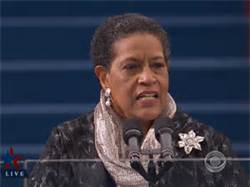 rs-Will
rs-Will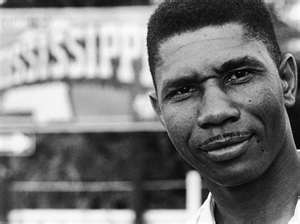 iams, widow of civil rights activist Medgar Evers, reflected on “Stand Your Ground” laws that, at least indirectly, helped secure Zimmerman’s acquittal, and the parallels with her husband’s murder by White racists on June 12, 1963. “Stand firm in the ground we have already made and be sure that nothing is taken away from us because there are efforts to turn back the clock of freedom. And I ask you today, will you allow that to happen? … Stand Your Ground in terms of fighting for justice and equality.”
iams, widow of civil rights activist Medgar Evers, reflected on “Stand Your Ground” laws that, at least indirectly, helped secure Zimmerman’s acquittal, and the parallels with her husband’s murder by White racists on June 12, 1963. “Stand firm in the ground we have already made and be sure that nothing is taken away from us because there are efforts to turn back the clock of freedom. And I ask you today, will you allow that to happen? … Stand Your Ground in terms of fighting for justice and equality.”
Martin Luther King III was able to move past the tired generalities of We-Still-Have-Work-To-Do and make a strong connection between his father’s unrealized Dream and the Martin tragedy. “The task is not done. The journey is not complete. … Sadly, the tears of Trayvon Martin’s mother and father remind us that far too frequently, the color of one’s skin remains a license to profile, to arrest, and to even murder without regard for the content of one’s character. … Regressive ‘Stand Your Ground’ laws must be repealed. Federal anti-profiling legislation must be enacted.”
Escaping the Preschool-To-Prison Pipeline
The March was not all about bemoaning the injustices we still face, however. There were calls to action made from the podium and during the talk shows that followed the next day. Rev. Sharpton placed much of the responsibility for helping young Black men escape the Preschool-to Prison Pipeline on the Elders who often criticize and condemn them : “If we told them who they could be and what they could do, they would pull up their pants an d get to work.”
After the March: The Talking Heads Have Their Day
The Relevant
Of course, the Sunday morning talk shows managed to extract considerable mileage from the March, with pundit after pundit giving 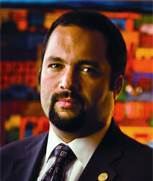 their take on the 50th Anniversary, the March the previous day and the current
their take on the 50th Anniversary, the March the previous day and the current state of Dr. King’s Dream. There were the usual platitudes about how We’ve Come A Long Way, But We’ve Got A Ways To Go. But there were some quite relevant and, dare I say it, important things that were said as well. Those who had participated in the previous day’s March, specifically NAACP Executive Director Benjamin Jealous (above left), veteran educator Dr. Marian Wright Edelman (above right), Congressman and 1963 marcher John Le
state of Dr. King’s Dream. There were the usual platitudes about how We’ve Come A Long Way, But We’ve Got A Ways To Go. But there were some quite relevant and, dare I say it, important things that were said as well. Those who had participated in the previous day’s March, specifically NAACP Executive Director Benjamin Jealous (above left), veteran educator Dr. Marian Wright Edelman (above right), Congressman and 1963 marcher John Le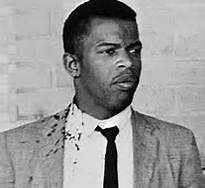 wis (left, to
wis (left, to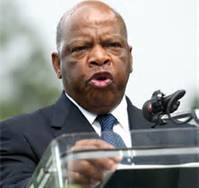 day and in 1963) and Rev. Sharpton, pointed out the continuing disparities in educa
day and in 1963) and Rev. Sharpton, pointed out the continuing disparities in educa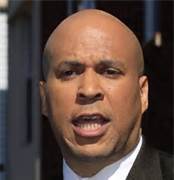 tion, economics, joblessness, voting rights and equal protection under the law. Newark, New Jersey Mayor Corey Booker
tion, economics, joblessness, voting rights and equal protection under the law. Newark, New Jersey Mayor Corey Booker 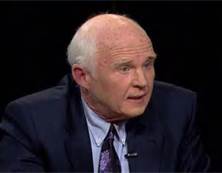 (right) pointed out the critical need for continued and escalated activism as part of a grand “Conspiracy of Love”. (I sometimes feel that Bro. Booker seems a little too “clean-cut”, but he does come up with some ideas that I like.) Taylor Branch (left), author in 1988 of the Pulitzer Prize-winning classic Parting The Waters: America In The King Years 1954-1963 and one of the most vocal White proponents of the Marches in 1963 and 2013, lamented the current “partisan gridlock” in the halls of the Federal Government as being “driven by race and racial resentment” against President Barack Obama.
(right) pointed out the critical need for continued and escalated activism as part of a grand “Conspiracy of Love”. (I sometimes feel that Bro. Booker seems a little too “clean-cut”, but he does come up with some ideas that I like.) Taylor Branch (left), author in 1988 of the Pulitzer Prize-winning classic Parting The Waters: America In The King Years 1954-1963 and one of the most vocal White proponents of the Marches in 1963 and 2013, lamented the current “partisan gridlock” in the halls of the Federal Government as being “driven by race and racial resentment” against President Barack Obama.
The Not-So-Relevant
The above statements, in my opinion, all represented positive, respectful interpretations of the importance of the March (whether you or I agree with them all or not). A number of remarks, however, were simple (and simplistic) platitudes designed to mollify the masses into the type of sociopolitical submission that comes from having been convinced that we are all, in fact, “free”. Proud examples of Black people who had escaped poverty to become Rhodes Scholars apparently overlooked the fact that the Rhodes Scholarship was named after arch-racist Cecil Rhodes (after whom Rhodesia was named) and was founded to prepare young Western (primarily White) Men to control the rest of the planet during the British Empire’s expected Colonial Age in Afrika. An attempt by more than one commentator to draw “a direct line” from Dr. King back to Abraham Lincoln and the Founding Fathers failed to mention the facts that the Founding Fathers were in large part slaveholders who had sanctioned the extermi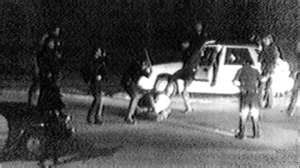 nation of the Indigenous People of North America, and that even Lincoln had stated on numerous occasions that, while he was against slavery, he harbored no “illusions” about Blacks being equal to Whites or even any desire that such equality should exist. And right-wing so-called “conservatives” who continue to decry such Marches as an exhortation to the politics of entitlement and “hopelessness” seem to forget that the very “hopelessness” they decry was created through the draconian policies of criminalization and brutality that they imposed, and that the “entitlements” that they condemn are those claimed by their benefactors in the Big Business and political elites as they insist on greater and greater profits, coupled with tax breaks, while their activities impoverish more and more Americans and dispossess more and more people around the world.
nation of the Indigenous People of North America, and that even Lincoln had stated on numerous occasions that, while he was against slavery, he harbored no “illusions” about Blacks being equal to Whites or even any desire that such equality should exist. And right-wing so-called “conservatives” who continue to decry such Marches as an exhortation to the politics of entitlement and “hopelessness” seem to forget that the very “hopelessness” they decry was created through the draconian policies of criminalization and brutality that they imposed, and that the “entitlements” that they condemn are those claimed by their benefactors in the Big Business and political elites as they insist on greater and greater profits, coupled with tax breaks, while their activities impoverish more and more Americans and dispossess more and more people around the world.
Free or Just Loose?
We’ve been called to many Marches over the last 17 years, inspired by the example of the March on Washington in 1963. All of them have embraced as a central theme the cause of Freedom and the ways in which the Black Community sees that Freedom as remaining out of our reach. While such Marches do hold inspirational value for many, and as Rev. Sharpton said, they serve to constantly expose the injustices we still face, the practical results from most of these Marches have been inconsistent at best, and they will ultimately be seen as exercises in futility by an increasing number of our people in the absence of some near-revolutionary change for the better. Many Pan-Afrikanists would argue that this is because we think our “freedom” is our birthright, won through the struggles of our Ancestors and Elders, when in reality this “freedom” is under constant attack from our enemies and taken for granted by our alleged friends, as a result of which it is under perpetual threat. Witness the current effort to repeal provisions of the Voting Rights Act in several Southern states with a record of voter intimidation, and the enactment of “Stand Your Ground” laws in between 20 and 30 states. We fail to realize that In reality, as Political Prisoner and Veteran Member of the Black Panther Party Marshall “Eddie” Conway has stated, “You’re not free; you’re just loose.” We as Afrikan people will perhaps finally begin the process toward truly being “free” when we turn loose our sense of activism, as Mayor Booker urged us to do, and free ourselves from the bonds that others have placed on us, and we have placed on ourselves.

